Module 2 Developing and Developed Countries模块同步练习(含答案解析)
文档属性
| 名称 | Module 2 Developing and Developed Countries模块同步练习(含答案解析) |
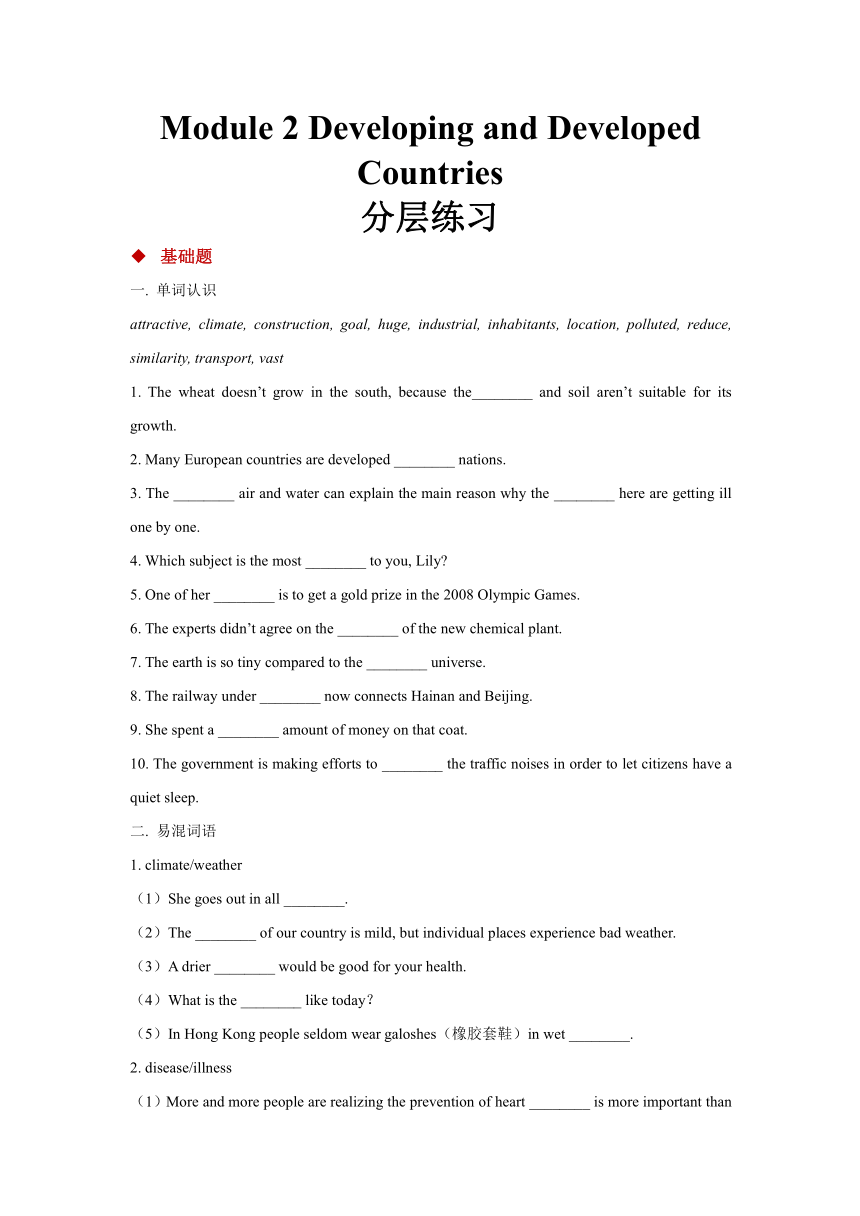
|
|
| 格式 | zip | ||
| 文件大小 | 43.7KB | ||
| 资源类型 | 教案 | ||
| 版本资源 | 外研版 | ||
| 科目 | 英语 | ||
| 更新时间 | 2019-07-16 00:00:00 | ||
图片预览

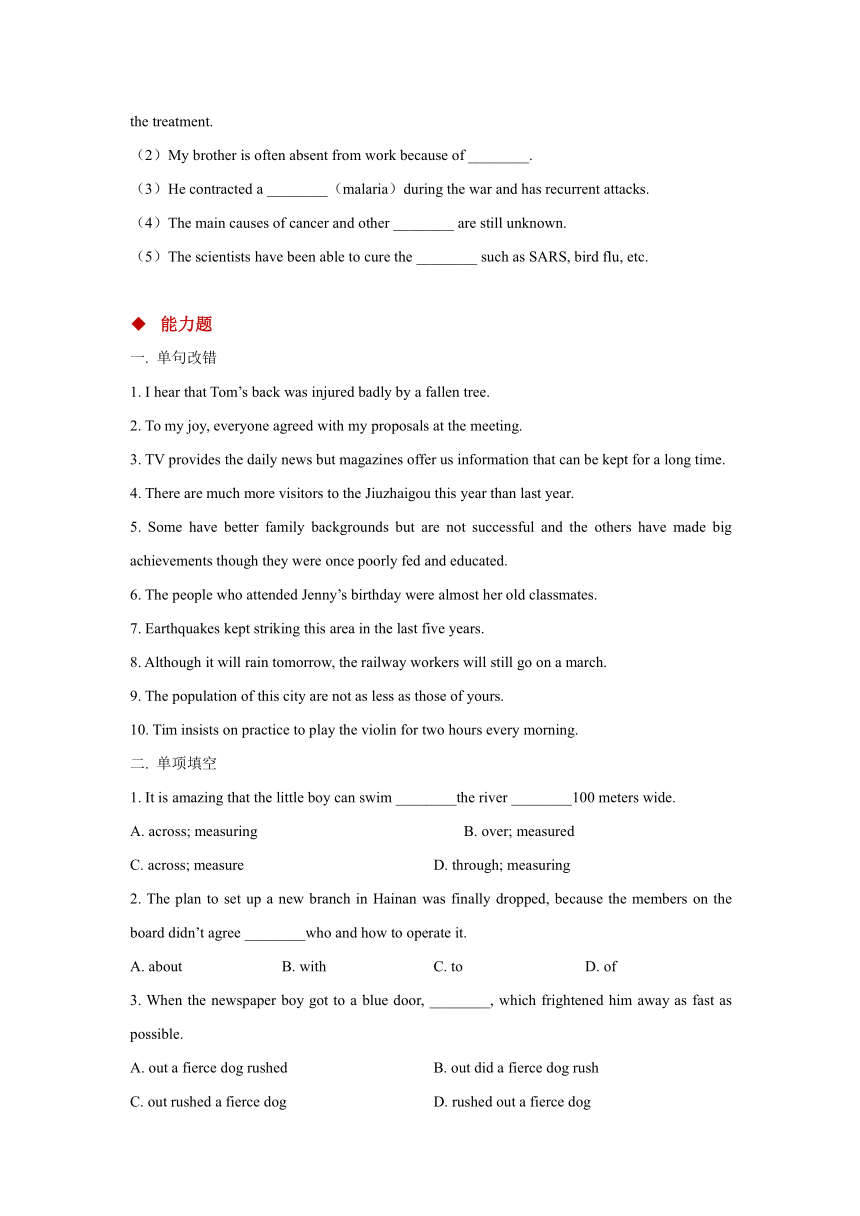
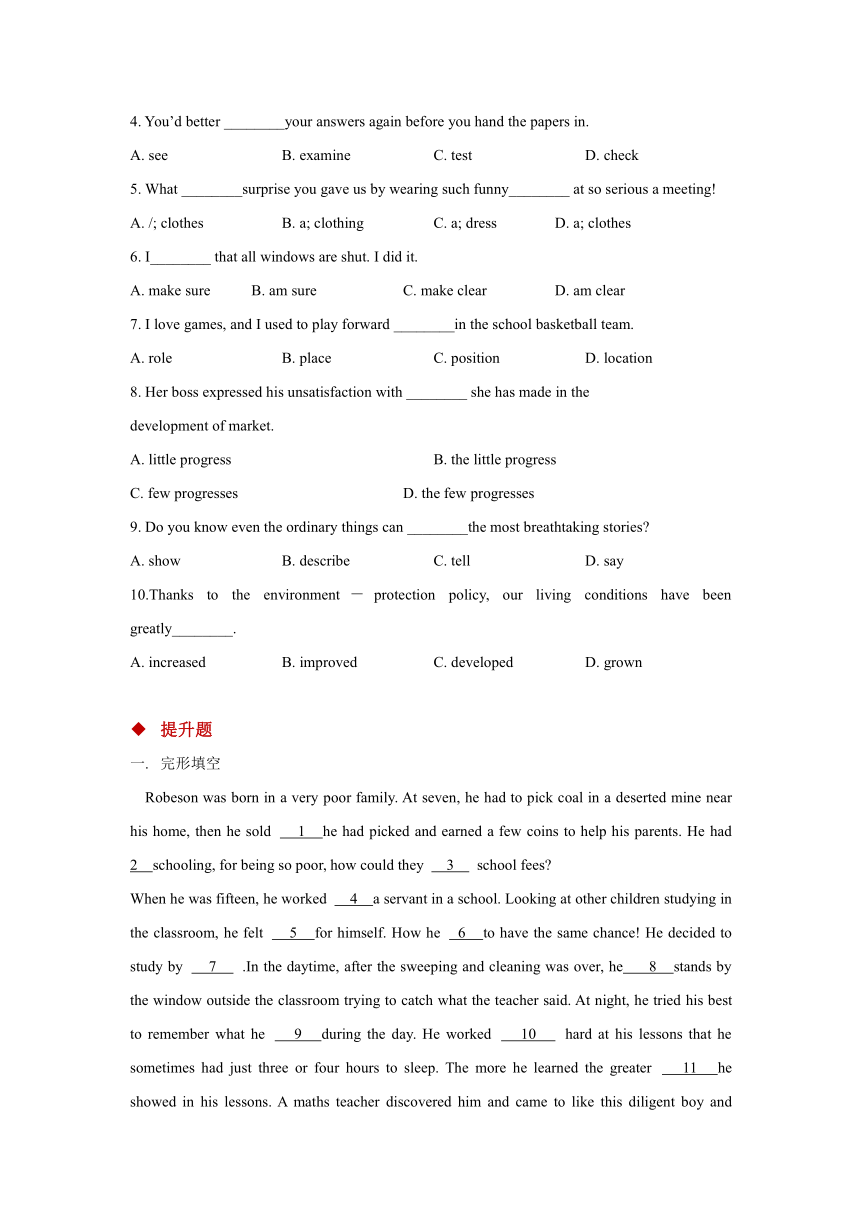
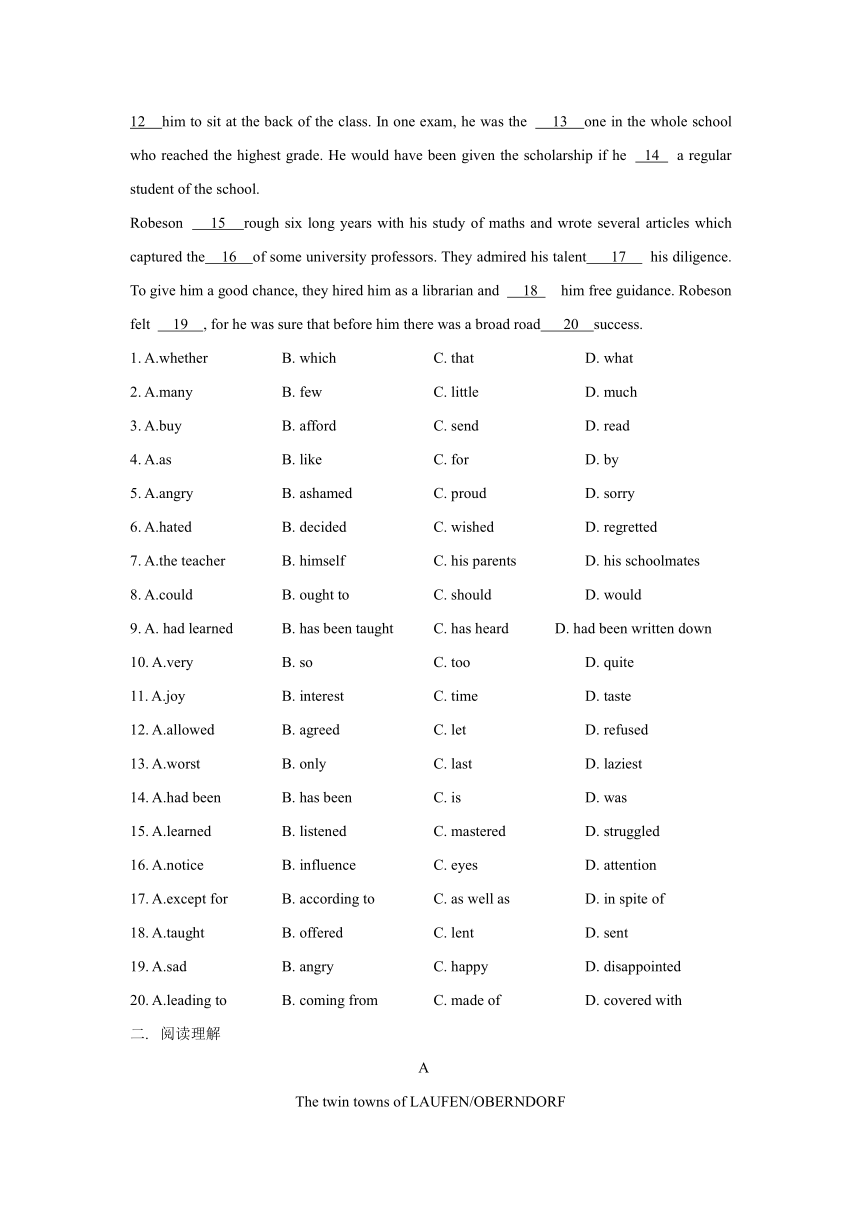
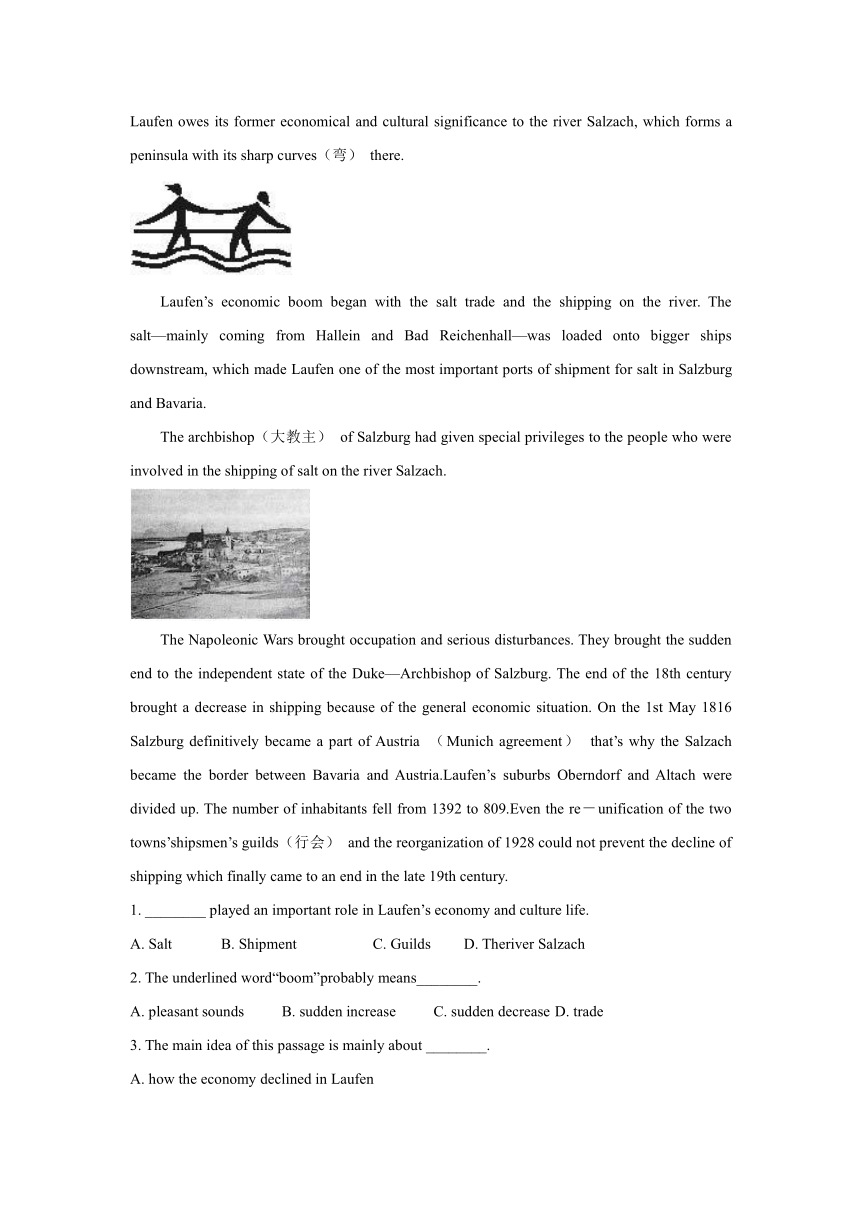
文档简介
Module 2 Developing and Developed Countries
分层练习
基础题
单词认识
attractive, climate, construction, goal, huge, industrial, inhabitants, location, polluted, reduce, similarity, transport, vast
1. The wheat doesn’t grow in the south, because the________ and soil aren’t suitable for its growth.
2. Many European countries are developed ________ nations.
3. The ________ air and water can explain the main reason why the ________ here are getting ill one by one.
4. Which subject is the most ________ to you, Lily?
5. One of her ________ is to get a gold prize in the 2008 Olympic Games.
6. The experts didn’t agree on the ________ of the new chemical plant.
7. The earth is so tiny compared to the ________ universe.
8. The railway under ________ now connects Hainan and Beijing.
9. She spent a ________ amount of money on that coat.
10. The government is making efforts to ________ the traffic noises in order to let citizens have a quiet sleep.
易混词语
1. climate/weather
(1)She goes out in all ________.
(2)The ________ of our country is mild, but individual places experience bad weather.
(3)A drier ________ would be good for your health.
(4)What is the ________ like today?
(5)In Hong Kong people seldom wear galoshes(橡胶套鞋)in wet ________.
2. disease/illness
(1)More and more people are realizing the prevention of heart ________ is more important than the treatment.
(2)My brother is often absent from work because of ________.
(3)He contracted a ________(malaria)during the war and has recurrent attacks.
(4)The main causes of cancer and other ________ are still unknown.
(5)The scientists have been able to cure the ________ such as SARS, bird flu, etc.
能力题
一. 单句改错
1. I hear that Tom’s back was injured badly by a fallen tree.
2. To my joy, everyone agreed with my proposals at the meeting.
3. TV provides the daily news but magazines offer us information that can be kept for a long time.
4. There are much more visitors to the Jiuzhaigou this year than last year.
5. Some have better family backgrounds but are not successful and the others have made big achievements though they were once poorly fed and educated.
6. The people who attended Jenny’s birthday were almost her old classmates.
7. Earthquakes kept striking this area in the last five years.
8. Although it will rain tomorrow, the railway workers will still go on a march.
9. The population of this city are not as less as those of yours.
10. Tim insists on practice to play the violin for two hours every morning.
二. 单项填空
1. It is amazing that the little boy can swim ________the river ________100 meters wide.
A. across; measuring B. over; measured
C. across; measure D. through; measuring
2. The plan to set up a new branch in Hainan was finally dropped, because the members on the board didn’t agree ________who and how to operate it.
A. about B. with C. to D. of
3. When the newspaper boy got to a blue door, ________, which frightened him away as fast as possible.
A. out a fierce dog rushed B. out did a fierce dog rush
C. out rushed a fierce dog D. rushed out a fierce dog
4. You’d better ________your answers again before you hand the papers in.
A. see B. examine C. test D. check
5. What ________surprise you gave us by wearing such funny________ at so serious a meeting!
A. /; clothes B. a; clothing C. a; dress D. a; clothes
6. I________ that all windows are shut. I did it.
A. make sure B. am sure C. make clear D. am clear
7. I love games, and I used to play forward ________in the school basketball team.
A. role B. place C. position D. location
8. Her boss expressed his unsatisfaction with ________ she has made in the
development of market.
A. little progress B. the little progress
C. few progresses D. the few progresses
9. Do you know even the ordinary things can ________the most breathtaking stories?
A. show B. describe C. tell D. say
10.Thanks to the environment-protection policy, our living conditions have been greatly________.
A. increased B. improved C. developed D. grown
提升题
完形填空
Robeson was born in a very poor family. At seven, he had to pick coal in a deserted mine near his home, then he sold 1 he had picked and earned a few coins to help his parents. He had 2 schooling, for being so poor, how could they 3 school fees?
When he was fifteen, he worked 4 a servant in a school. Looking at other children studying in the classroom, he felt 5 for himself. How he 6 to have the same chance! He decided to study by 7 .In the daytime, after the sweeping and cleaning was over, he 8 stands by the window outside the classroom trying to catch what the teacher said. At night, he tried his best to remember what he 9 during the day. He worked 10 hard at his lessons that he sometimes had just three or four hours to sleep. The more he learned the greater 11 he showed in his lessons. A maths teacher discovered him and came to like this diligent boy and 12 him to sit at the back of the class. In one exam, he was the 13 one in the whole school who reached the highest grade. He would have been given the scholarship if he 14 a regular student of the school.
Robeson 15 rough six long years with his study of maths and wrote several articles which captured the 16 of some university professors. They admired his talent 17 his diligence. To give him a good chance, they hired him as a librarian and 18 him free guidance. Robeson felt 19 , for he was sure that before him there was a broad road 20 success.
1. A.whether B. which C. that D. what
2. A.many B. few C. little D. much
3. A.buy B. afford C. send D. read
4. A.as B. like C. for D. by
5. A.angry B. ashamed C. proud D. sorry
6. A.hated B. decided C. wished D. regretted
7. A.the teacher B. himself C. his parents D. his schoolmates
8. A.could B. ought to C. should D. would
9. A. had learned B. has been taught C. has heard D. had been written down
10. A.very B. so C. too D. quite
11. A.joy B. interest C. time D. taste
12. A.allowed B. agreed C. let D. refused
13. A.worst B. only C. last D. laziest
14. A.had been B. has been C. is D. was
15. A.learned B. listened C. mastered D. struggled
16. A.notice B. influence C. eyes D. attention
17. A.except for B. according to C. as well as D. in spite of
18. A.taught B. offered C. lent D. sent
19. A.sad B. angry C. happy D. disappointed
20. A.leading to B. coming from C. made of D. covered with
阅读理解
A
The twin towns of LAUFEN/OBERNDORF
Laufen owes its former economical and cultural significance to the river Salzach, which forms a peninsula with its sharp curves(弯) there.
Laufen’s economic boom began with the salt trade and the shipping on the river. The salt—mainly coming from Hallein and Bad Reichenhall—was loaded onto bigger ships downstream, which made Laufen one of the most important ports of shipment for salt in Salzburg and Bavaria.
The archbishop(大教主) of Salzburg had given special privileges to the people who were involved in the shipping of salt on the river Salzach.
The Napoleonic Wars brought occupation and serious disturbances. They brought the sudden end to the independent state of the Duke—Archbishop of Salzburg. The end of the 18th century brought a decrease in shipping because of the general economic situation. On the 1st May 1816 Salzburg definitively became a part of Austria (Munich agreement) that’s why the Salzach became the border between Bavaria and Austria.Laufen’s suburbs Oberndorf and Altach were divided up. The number of inhabitants fell from 1392 to 809.Even the re-unification of the two towns’shipsmen’s guilds(行会) and the reorganization of 1928 could not prevent the decline of shipping which finally came to an end in the late 19th century.
1. ________ played an important role in Laufen’s economy and culture life.
A. Salt B. Shipment C. Guilds D. Theriver Salzach
2. The underlined word“boom”probably means________.
A. pleasant sounds B. sudden increase C. sudden decrease D. trade
3. The main idea of this passage is mainly about ________.
A. how the economy declined in Laufen
B. the effects of The Napoleonic Wars
C. how the twin towns of LAUFEN and OBERNDORF came into being
D. the history of Salzburg
B
Tourism probably started in Roman times. Rich Romans visited friends and family who were working in another part of the Roman empire. But when the empire broke down, this kind of tourism stopped.
In the early 17th century, the idea of the “Grand Tour” was born. Rich young English people sailed across the English Channel(英吉利海峡).They visited the most beautiful and important European cities of the time, including Paris in France, and Rome and Venice(威尼斯)in Italy. Their tours lasted for two to four years, and the tourists stayed a few weeks or months in each city. The “Grand Tour” was an important part of young people’s education—but only for the rich.
In the 18th century, tourism began to change. For example, people in the UK started to visit some towns, such as Bath to “take the waters”. They believed that the water there was good for their health. So large and expensive hotels were built in these towns.
In the 19th century, travel became much more popular and faster. When the first railways were built in the 1820s, it was easier for people to travel between towns, so they started to go for holidays by the sea. And some started to have holidays in the countryside as cities became larger, noisier and dirtier.
Traveling by sea also became faster and safer when the first steamships were built. People began to travel more to far away countries.
The 20th century saw cars become more and more popular among ordinary people. Planes were made larger, so ticket prices dropped and more people used them.
Thus tourism grew. In 1949,Russian journalist Vladimir Raitz started a company called Horizon Holidays. The company organizes everything—plane tickets, hotel rooms, even food—and tourists pay for it all before they leave home. The package tour and modern tourist industry was born.
The first travel agency in China was set up as early as 1949.But tourism did not take off until 1978.In 2002, the industry was worth 500 billion yuan and became an important part of China’s social development.
4. In the early times, the travelers ________.
A. all came from Roman
B. were very young and strong
C. had lots of money
D. traveled by boat
5.________ played the most important role in the tourism development.
A. Education B. Money C. Transportation D. People’s ideas
6. Modern tourism was born ________.
A. in 1949 B. in Roman times
C. in the early 17th century D. in the 19th century
7. The underlined phrase “take off” means ________.
A. a plane rising into the air
B. develop very fast
C. remove hats and clothes
D. bring down the prices
答案和解析
基础题
【答案】
一.单词认识
1. climate
2. industrial
3. polluted,inhabitants
4. attractive
5. goals
6. location
7. vast
8. construction
9. huge
10. reduce
二.易混词语
1.辨析:climate,weather这两个词的词义有细微的差异,使用场合也有所不同。
climate指某地的平均气候或经常性的气候(average weather conditions);weather指某地一时的天气,如寒暖、晴雨和干湿的变化情况(a particular condition of wind,rain,snow,sunshine,etc.)。
请注意,weather之前不可以用不定冠词a来修饰。例如我们不可以说:What a brilliant weather!应把a删去。
答案:(1)weathers (2)climate (3)climate (4)weather (5)weather
2.辨析:disease 指具体的病或严重的疾病,尤指由细菌或病毒所导致的“传染病”,如流感、麻疹、百日咳、热病等。
illness 指由病人内部的虚弱或失调而致,侧重点在内因。
答案:(1)disease (2)illness (3)disease (4)diseases (5)diseases
能力题
【答案】
一.单句改错
1.解析:只有正在倒下的树才能伤着人。
答案:fallen→falling
2.解析:agree with 后接人或话作宾语;agree to 后接计划、安排等名词作宾语。
答案:with→to
3.解析:此处是对比而不是转折。
答案:but→while
4.解析:当比较级后接复数名词时,比较级前用many。
答案:much→many
5.解析:当我们所说的人或事还有第三部分或第四部分时,用other。当只有两部分时other前面加the。
答案:去掉the
6.解析:almost 意为“差一点就……”;mostly 指数量,“大部分”。
答案:almost→mostly
7.解析:in the last five years与现在完成时连用。
答案:kept前加have
8.解析:让步状语从句中用一般现在时代替一般将来时。
答案:will rain→rains
9.解析:此句共有三处错误:population作主语,谓语用单数;as...as...中间的形容词或副词用原级;population为不可数名词,所以要用that代替。
答案:are→is;less→little;those→that
10.解析:practise后接动名词作宾语。
答案:to play→playing
二.单项填空
1.解析:从河的这边游到那边用across;measuring此处作定语修饰river,是不及物动词,意为“测量起来,计算起来有……长”,后面接数字。
答案:A
2.解析:not agree about 在……方面意见不一致。
答案:A
3.解析:out置于该句句首,该句需要用完全倒装。
答案:C
4.解析:本题考查动词的辨析。see“看见”,不合题意;examine“检查;诊断”,强调给病人作医学检查或进行过关检查;test“测验;检验”,强调通过考试或实践来验证;check“检查;核对”,强调对答案、数字、名单等核对,看有没有出现错误。根据题意“在你交卷前,最好再核对一遍答案”可知D为最佳答案。
答案:D
5.解析:a surprise 一件令人惊奇的事;clothing是“衣物”的总称,不可数,如果表示一套身上穿的衣服一般用clothes,clothes是集体名词,复数。
答案:D
6.解析:be sure that 确信,保证;make sure that 确保。
答案:B
7.解析:position 位置;forward position 前锋位置。
答案:C
8.解析:progress是不可数名词,该由few修饰;progress在此句中已有所指,故前面要加定冠词进行特指。
答案:B
9.解析:show 表现出;describe 描述;tell 说出,讲;say 说话。
答案:C
10.解析:increase 增加;improve 改善;develop 发展,开发;grow 增长,成长。
答案:B
提升题
【答案】
完形填空
1.解析:what引导宾语从句,在从句中作宾语,意为“所……的东西”。
答案:D
2.答案:C
3.解析:由于家里穷,支付不起学杂费,Robeson一天正规的教育也没接受过,只是在数学课堂当过几天旁听生。
答案:B
4.解析:work as是固定词组,意为“当……”。
答案:A
5.解析:feel / be sorry for是固定词组,意为“为……感到惋惜;为……感到难过”。
答案:D
6.解析:他多想有这样的机会呀!
答案:C
7.解析:study by oneself意为“自学”。
答案:B
8.解析:表示过去经常性、反复性的动作,常作“总是”解。
答案:D
9.解析:“学习”是在“尽力记住”之前发生的动作,故用过去完成时态。
答案:A
10.解析:本句使用的是“so...that”句型。
答案:B
11.解析:show interest in是固定词组。
答案:B
12.解析:根据句子中“...came to like this diligent boy...”可判断这位数学老师允许Robeson坐在教室后面听课。
答案:A
13.解析:从下文可知,他是这次考试中全校成绩最高的。
答案:B
14.解析:由主句动词would have been given可知,这是表示与过去事实相反的虚拟语气。
答案:A
15.答案:D
16.解析:Robeson奋斗了六年学习数学,写了几篇文章,这些文章引起了一些大学教授的注意。
答案:D
17.解析:教授们钦佩他的勤奋和才华。
答案:C
18.解析:教授们为他提供免费指导。
答案:B
19.答案:C
20.解析:Robeson很有幸福感,因为他确信他面前是一条宽阔的通向成功的路。
答案:A
二. 阅读理解
1.解析:文章第一段已介绍了Salzach在以前的Laufen的经济文化中起了重要的作用。
答案:D
2.解析:根据该段的意思可知,boom应该表示“兴起”。
答案:B
3.解析:全文主要介绍姊妹城Laufen和Oberndorf的由来。
答案:C
4.解析:细节理解题。根据“The ‘Grand Tour’ was an important part of young people’s education—but only for the rich.”可知。
答案:C
5.解析:文章提供了这样一个信息:铁路的发展,飞机的容量扩大都给旅游业起了促进作用。
答案:C
6.解析:细节理解题。根据倒数第二段的叙述可知。
答案:A
7.解析:该词的前一句介绍:中国的旅行社是在1949年建立,但是旅游业直到1978年才______。因此我们推断该词的意思应该是“兴旺,兴起”之类的意思。故选项B为最佳答案。
答案:B
分层练习
基础题
单词认识
attractive, climate, construction, goal, huge, industrial, inhabitants, location, polluted, reduce, similarity, transport, vast
1. The wheat doesn’t grow in the south, because the________ and soil aren’t suitable for its growth.
2. Many European countries are developed ________ nations.
3. The ________ air and water can explain the main reason why the ________ here are getting ill one by one.
4. Which subject is the most ________ to you, Lily?
5. One of her ________ is to get a gold prize in the 2008 Olympic Games.
6. The experts didn’t agree on the ________ of the new chemical plant.
7. The earth is so tiny compared to the ________ universe.
8. The railway under ________ now connects Hainan and Beijing.
9. She spent a ________ amount of money on that coat.
10. The government is making efforts to ________ the traffic noises in order to let citizens have a quiet sleep.
易混词语
1. climate/weather
(1)She goes out in all ________.
(2)The ________ of our country is mild, but individual places experience bad weather.
(3)A drier ________ would be good for your health.
(4)What is the ________ like today?
(5)In Hong Kong people seldom wear galoshes(橡胶套鞋)in wet ________.
2. disease/illness
(1)More and more people are realizing the prevention of heart ________ is more important than the treatment.
(2)My brother is often absent from work because of ________.
(3)He contracted a ________(malaria)during the war and has recurrent attacks.
(4)The main causes of cancer and other ________ are still unknown.
(5)The scientists have been able to cure the ________ such as SARS, bird flu, etc.
能力题
一. 单句改错
1. I hear that Tom’s back was injured badly by a fallen tree.
2. To my joy, everyone agreed with my proposals at the meeting.
3. TV provides the daily news but magazines offer us information that can be kept for a long time.
4. There are much more visitors to the Jiuzhaigou this year than last year.
5. Some have better family backgrounds but are not successful and the others have made big achievements though they were once poorly fed and educated.
6. The people who attended Jenny’s birthday were almost her old classmates.
7. Earthquakes kept striking this area in the last five years.
8. Although it will rain tomorrow, the railway workers will still go on a march.
9. The population of this city are not as less as those of yours.
10. Tim insists on practice to play the violin for two hours every morning.
二. 单项填空
1. It is amazing that the little boy can swim ________the river ________100 meters wide.
A. across; measuring B. over; measured
C. across; measure D. through; measuring
2. The plan to set up a new branch in Hainan was finally dropped, because the members on the board didn’t agree ________who and how to operate it.
A. about B. with C. to D. of
3. When the newspaper boy got to a blue door, ________, which frightened him away as fast as possible.
A. out a fierce dog rushed B. out did a fierce dog rush
C. out rushed a fierce dog D. rushed out a fierce dog
4. You’d better ________your answers again before you hand the papers in.
A. see B. examine C. test D. check
5. What ________surprise you gave us by wearing such funny________ at so serious a meeting!
A. /; clothes B. a; clothing C. a; dress D. a; clothes
6. I________ that all windows are shut. I did it.
A. make sure B. am sure C. make clear D. am clear
7. I love games, and I used to play forward ________in the school basketball team.
A. role B. place C. position D. location
8. Her boss expressed his unsatisfaction with ________ she has made in the
development of market.
A. little progress B. the little progress
C. few progresses D. the few progresses
9. Do you know even the ordinary things can ________the most breathtaking stories?
A. show B. describe C. tell D. say
10.Thanks to the environment-protection policy, our living conditions have been greatly________.
A. increased B. improved C. developed D. grown
提升题
完形填空
Robeson was born in a very poor family. At seven, he had to pick coal in a deserted mine near his home, then he sold 1 he had picked and earned a few coins to help his parents. He had 2 schooling, for being so poor, how could they 3 school fees?
When he was fifteen, he worked 4 a servant in a school. Looking at other children studying in the classroom, he felt 5 for himself. How he 6 to have the same chance! He decided to study by 7 .In the daytime, after the sweeping and cleaning was over, he 8 stands by the window outside the classroom trying to catch what the teacher said. At night, he tried his best to remember what he 9 during the day. He worked 10 hard at his lessons that he sometimes had just three or four hours to sleep. The more he learned the greater 11 he showed in his lessons. A maths teacher discovered him and came to like this diligent boy and 12 him to sit at the back of the class. In one exam, he was the 13 one in the whole school who reached the highest grade. He would have been given the scholarship if he 14 a regular student of the school.
Robeson 15 rough six long years with his study of maths and wrote several articles which captured the 16 of some university professors. They admired his talent 17 his diligence. To give him a good chance, they hired him as a librarian and 18 him free guidance. Robeson felt 19 , for he was sure that before him there was a broad road 20 success.
1. A.whether B. which C. that D. what
2. A.many B. few C. little D. much
3. A.buy B. afford C. send D. read
4. A.as B. like C. for D. by
5. A.angry B. ashamed C. proud D. sorry
6. A.hated B. decided C. wished D. regretted
7. A.the teacher B. himself C. his parents D. his schoolmates
8. A.could B. ought to C. should D. would
9. A. had learned B. has been taught C. has heard D. had been written down
10. A.very B. so C. too D. quite
11. A.joy B. interest C. time D. taste
12. A.allowed B. agreed C. let D. refused
13. A.worst B. only C. last D. laziest
14. A.had been B. has been C. is D. was
15. A.learned B. listened C. mastered D. struggled
16. A.notice B. influence C. eyes D. attention
17. A.except for B. according to C. as well as D. in spite of
18. A.taught B. offered C. lent D. sent
19. A.sad B. angry C. happy D. disappointed
20. A.leading to B. coming from C. made of D. covered with
阅读理解
A
The twin towns of LAUFEN/OBERNDORF
Laufen owes its former economical and cultural significance to the river Salzach, which forms a peninsula with its sharp curves(弯) there.
Laufen’s economic boom began with the salt trade and the shipping on the river. The salt—mainly coming from Hallein and Bad Reichenhall—was loaded onto bigger ships downstream, which made Laufen one of the most important ports of shipment for salt in Salzburg and Bavaria.
The archbishop(大教主) of Salzburg had given special privileges to the people who were involved in the shipping of salt on the river Salzach.
The Napoleonic Wars brought occupation and serious disturbances. They brought the sudden end to the independent state of the Duke—Archbishop of Salzburg. The end of the 18th century brought a decrease in shipping because of the general economic situation. On the 1st May 1816 Salzburg definitively became a part of Austria (Munich agreement) that’s why the Salzach became the border between Bavaria and Austria.Laufen’s suburbs Oberndorf and Altach were divided up. The number of inhabitants fell from 1392 to 809.Even the re-unification of the two towns’shipsmen’s guilds(行会) and the reorganization of 1928 could not prevent the decline of shipping which finally came to an end in the late 19th century.
1. ________ played an important role in Laufen’s economy and culture life.
A. Salt B. Shipment C. Guilds D. Theriver Salzach
2. The underlined word“boom”probably means________.
A. pleasant sounds B. sudden increase C. sudden decrease D. trade
3. The main idea of this passage is mainly about ________.
A. how the economy declined in Laufen
B. the effects of The Napoleonic Wars
C. how the twin towns of LAUFEN and OBERNDORF came into being
D. the history of Salzburg
B
Tourism probably started in Roman times. Rich Romans visited friends and family who were working in another part of the Roman empire. But when the empire broke down, this kind of tourism stopped.
In the early 17th century, the idea of the “Grand Tour” was born. Rich young English people sailed across the English Channel(英吉利海峡).They visited the most beautiful and important European cities of the time, including Paris in France, and Rome and Venice(威尼斯)in Italy. Their tours lasted for two to four years, and the tourists stayed a few weeks or months in each city. The “Grand Tour” was an important part of young people’s education—but only for the rich.
In the 18th century, tourism began to change. For example, people in the UK started to visit some towns, such as Bath to “take the waters”. They believed that the water there was good for their health. So large and expensive hotels were built in these towns.
In the 19th century, travel became much more popular and faster. When the first railways were built in the 1820s, it was easier for people to travel between towns, so they started to go for holidays by the sea. And some started to have holidays in the countryside as cities became larger, noisier and dirtier.
Traveling by sea also became faster and safer when the first steamships were built. People began to travel more to far away countries.
The 20th century saw cars become more and more popular among ordinary people. Planes were made larger, so ticket prices dropped and more people used them.
Thus tourism grew. In 1949,Russian journalist Vladimir Raitz started a company called Horizon Holidays. The company organizes everything—plane tickets, hotel rooms, even food—and tourists pay for it all before they leave home. The package tour and modern tourist industry was born.
The first travel agency in China was set up as early as 1949.But tourism did not take off until 1978.In 2002, the industry was worth 500 billion yuan and became an important part of China’s social development.
4. In the early times, the travelers ________.
A. all came from Roman
B. were very young and strong
C. had lots of money
D. traveled by boat
5.________ played the most important role in the tourism development.
A. Education B. Money C. Transportation D. People’s ideas
6. Modern tourism was born ________.
A. in 1949 B. in Roman times
C. in the early 17th century D. in the 19th century
7. The underlined phrase “take off” means ________.
A. a plane rising into the air
B. develop very fast
C. remove hats and clothes
D. bring down the prices
答案和解析
基础题
【答案】
一.单词认识
1. climate
2. industrial
3. polluted,inhabitants
4. attractive
5. goals
6. location
7. vast
8. construction
9. huge
10. reduce
二.易混词语
1.辨析:climate,weather这两个词的词义有细微的差异,使用场合也有所不同。
climate指某地的平均气候或经常性的气候(average weather conditions);weather指某地一时的天气,如寒暖、晴雨和干湿的变化情况(a particular condition of wind,rain,snow,sunshine,etc.)。
请注意,weather之前不可以用不定冠词a来修饰。例如我们不可以说:What a brilliant weather!应把a删去。
答案:(1)weathers (2)climate (3)climate (4)weather (5)weather
2.辨析:disease 指具体的病或严重的疾病,尤指由细菌或病毒所导致的“传染病”,如流感、麻疹、百日咳、热病等。
illness 指由病人内部的虚弱或失调而致,侧重点在内因。
答案:(1)disease (2)illness (3)disease (4)diseases (5)diseases
能力题
【答案】
一.单句改错
1.解析:只有正在倒下的树才能伤着人。
答案:fallen→falling
2.解析:agree with 后接人或话作宾语;agree to 后接计划、安排等名词作宾语。
答案:with→to
3.解析:此处是对比而不是转折。
答案:but→while
4.解析:当比较级后接复数名词时,比较级前用many。
答案:much→many
5.解析:当我们所说的人或事还有第三部分或第四部分时,用other。当只有两部分时other前面加the。
答案:去掉the
6.解析:almost 意为“差一点就……”;mostly 指数量,“大部分”。
答案:almost→mostly
7.解析:in the last five years与现在完成时连用。
答案:kept前加have
8.解析:让步状语从句中用一般现在时代替一般将来时。
答案:will rain→rains
9.解析:此句共有三处错误:population作主语,谓语用单数;as...as...中间的形容词或副词用原级;population为不可数名词,所以要用that代替。
答案:are→is;less→little;those→that
10.解析:practise后接动名词作宾语。
答案:to play→playing
二.单项填空
1.解析:从河的这边游到那边用across;measuring此处作定语修饰river,是不及物动词,意为“测量起来,计算起来有……长”,后面接数字。
答案:A
2.解析:not agree about 在……方面意见不一致。
答案:A
3.解析:out置于该句句首,该句需要用完全倒装。
答案:C
4.解析:本题考查动词的辨析。see“看见”,不合题意;examine“检查;诊断”,强调给病人作医学检查或进行过关检查;test“测验;检验”,强调通过考试或实践来验证;check“检查;核对”,强调对答案、数字、名单等核对,看有没有出现错误。根据题意“在你交卷前,最好再核对一遍答案”可知D为最佳答案。
答案:D
5.解析:a surprise 一件令人惊奇的事;clothing是“衣物”的总称,不可数,如果表示一套身上穿的衣服一般用clothes,clothes是集体名词,复数。
答案:D
6.解析:be sure that 确信,保证;make sure that 确保。
答案:B
7.解析:position 位置;forward position 前锋位置。
答案:C
8.解析:progress是不可数名词,该由few修饰;progress在此句中已有所指,故前面要加定冠词进行特指。
答案:B
9.解析:show 表现出;describe 描述;tell 说出,讲;say 说话。
答案:C
10.解析:increase 增加;improve 改善;develop 发展,开发;grow 增长,成长。
答案:B
提升题
【答案】
完形填空
1.解析:what引导宾语从句,在从句中作宾语,意为“所……的东西”。
答案:D
2.答案:C
3.解析:由于家里穷,支付不起学杂费,Robeson一天正规的教育也没接受过,只是在数学课堂当过几天旁听生。
答案:B
4.解析:work as是固定词组,意为“当……”。
答案:A
5.解析:feel / be sorry for是固定词组,意为“为……感到惋惜;为……感到难过”。
答案:D
6.解析:他多想有这样的机会呀!
答案:C
7.解析:study by oneself意为“自学”。
答案:B
8.解析:表示过去经常性、反复性的动作,常作“总是”解。
答案:D
9.解析:“学习”是在“尽力记住”之前发生的动作,故用过去完成时态。
答案:A
10.解析:本句使用的是“so...that”句型。
答案:B
11.解析:show interest in是固定词组。
答案:B
12.解析:根据句子中“...came to like this diligent boy...”可判断这位数学老师允许Robeson坐在教室后面听课。
答案:A
13.解析:从下文可知,他是这次考试中全校成绩最高的。
答案:B
14.解析:由主句动词would have been given可知,这是表示与过去事实相反的虚拟语气。
答案:A
15.答案:D
16.解析:Robeson奋斗了六年学习数学,写了几篇文章,这些文章引起了一些大学教授的注意。
答案:D
17.解析:教授们钦佩他的勤奋和才华。
答案:C
18.解析:教授们为他提供免费指导。
答案:B
19.答案:C
20.解析:Robeson很有幸福感,因为他确信他面前是一条宽阔的通向成功的路。
答案:A
二. 阅读理解
1.解析:文章第一段已介绍了Salzach在以前的Laufen的经济文化中起了重要的作用。
答案:D
2.解析:根据该段的意思可知,boom应该表示“兴起”。
答案:B
3.解析:全文主要介绍姊妹城Laufen和Oberndorf的由来。
答案:C
4.解析:细节理解题。根据“The ‘Grand Tour’ was an important part of young people’s education—but only for the rich.”可知。
答案:C
5.解析:文章提供了这样一个信息:铁路的发展,飞机的容量扩大都给旅游业起了促进作用。
答案:C
6.解析:细节理解题。根据倒数第二段的叙述可知。
答案:A
7.解析:该词的前一句介绍:中国的旅行社是在1949年建立,但是旅游业直到1978年才______。因此我们推断该词的意思应该是“兴旺,兴起”之类的意思。故选项B为最佳答案。
答案:B
